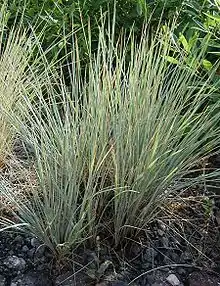| Helictotrichon sempervirens | |
|---|---|
 | |
| Scientific classification | |
| Kingdom: | Plantae |
| Clade: | Tracheophytes |
| Clade: | Angiosperms |
| Clade: | Monocots |
| Clade: | Commelinids |
| Order: | Poales |
| Family: | Poaceae |
| Subfamily: | Pooideae |
| Genus: | Helictotrichon |
| Species: | H. sempervirens |
| Binomial name | |
| Helictotrichon sempervirens (Vill.) Pilg.[1] | |
| Synonyms | |
|
Avena notarisii Parl. | |
Helictotrichon sempervirens, the blue oat grass, is a species of flowering plant in the true grass family, Poaceae, native to central and southwest European grasslands. It is a bunchgrass often used as an ornamental grass in garden design and landscaping.
The foliage is pale green with a hint of blue. It grows in an arching shape, up to 140 cm (55 in) tall by 60 cm (24 in) wide.[2] The grass blooms with pale blue-green flowers in May to August. The plant is an evergreen perennial, although with summer drought stress semi-dormancy occurs. The Latin name sempervirens literally means "immortal" but in botany means "evergreen".[3]
This plant has gained the Royal Horticultural Society's Award of Garden Merit.[4][5]
References
- ↑ "Helictotrichon sempervirens". Germplasm Resources Information Network. Agricultural Research Service, United States Department of Agriculture. Retrieved 27 July 2013.
- ↑ RHS A-Z encyclopedia of garden plants. United Kingdom: Dorling Kindersley. 2008. p. 1136. ISBN 978-1405332965.
- ↑ Harrison, Lorraine (2012). RHS Latin for gardeners. United Kingdom: Mitchell Beazley. p. 224. ISBN 9781845337315.
- ↑ "Helictotrichon sempervirens AGM". RHS Plant Finder. Royal Horticultural Society. Retrieved 4 August 2020.
- ↑ "AGM Plants - Ornamental" (PDF). Royal Horticultural Society. July 2017. p. 47. Retrieved 3 March 2018.
- Repertorium Specierum Novarum Regni Vegetabilis. Centralblatt für Sammlung und Veroffentlichung von Einzeldiagnosen neuer Pflanzen (Helictotrichon sempervirens); [Edited by Friedrich Fedde]. Berlin 45:7. 1938
- GrassBase: Helictotrichon sempervirens entry
External links
![]() Data related to Helictotrichon sempervirens at Wikispecies
Data related to Helictotrichon sempervirens at Wikispecies